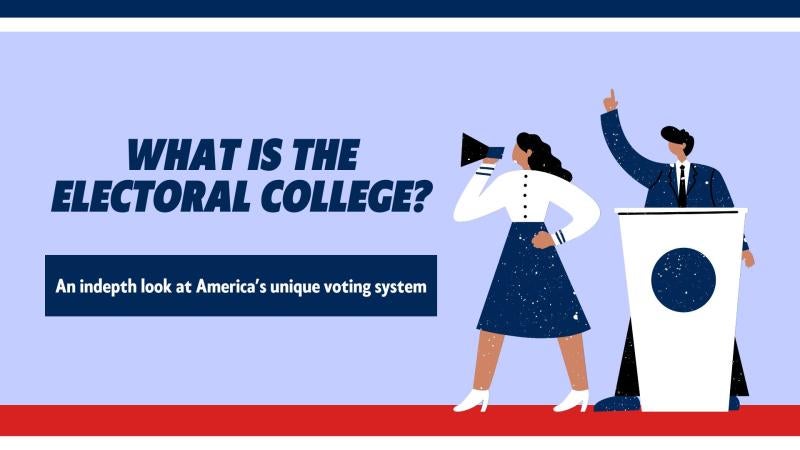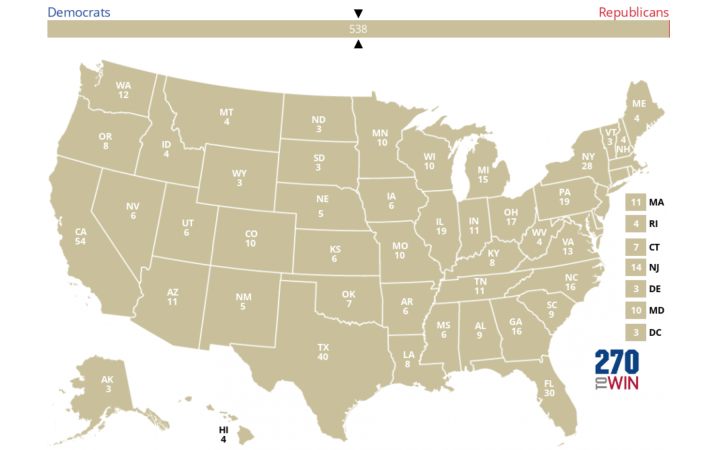
Understanding the electoral college and why your vote counts
In two weeks, election day will finally be here and eligible citizens will cast their votes to choose the next president of the United States. In fact, some citizens may have already taken part by voting early or voting by mail.
Every ballot will count for the popular vote, which is a direct count of the individual votes received by each candidate. The popular vote is crucial because it shows whom the majority want as president, but it is not the deciding factor in electing who will be the next president.
After the popular vote, the electoral college meets, always on the first Tuesday after the second Wednesday in December following the presidential election. In 2024 that will be Tuesday, Dec. 17. And only after the electoral college has voted will the U.S. get its next president.
Five times in U.S. history the candidate who did not get the majority of eligible citizens' votes went on to become president. Why?
What is the electoral college and what does it do?
Although the electoral college has existed since 1787 with the birth of the Constitution, many Americans are still asking the same two questions — what is it and why do we have it?
The electoral college is a group of electors in Congress that represent each state based on their combined number of seats in the Senate and the House of Representatives. The electoral college, not the people, has the final say in who becomes president.
In the electoral college, each state has a different number of electoral votes based on their population, coupled with two votes representing each state's two senators.
For example, Ohio has 17 electoral votes because it has two senators and 15 members in the house. The state with the highest amount of electoral votes is California with 54, followed by Texas with 40. Washington D.C., not a state, has three electoral college votes.
In total, there are 538 electors, and a candidate must receive 270 of those votes to win the presidency. This is due to the “winner-take-all” system.
The electoral college vote and the popular vote
The “winner-take-all” system says that if a candidate wins the majority of the popular vote in a state, then that candidate will receive all of the electoral votes for that state. In 48 states and Washington, D.C., the winner gets all the electoral votes for that state. Maine and Nebraska assign their electors using a proportional system.
How this works in Ohio is that if a candidate wins, for example, only 51% of Ohio’s popular vote, then that candidate would be awarded all 17 of Ohio’s electoral votes. This is controversial to some people because it also means that 49% of the population’s votes are dismissed, and this can sometimes allow for a candidate to win the presidency even if they don’t win the popular vote depending on how they run up their totals in each state.
Steve Couch, a local government teacher at Mentor High School, explained that the design of the electoral college can sometimes be referred to as undemocratic because giving each state two senate votes warps the representation.
“The Senate is fundamentally undemocratic by design. It makes each state equal,” Couch said. “When you import that into the electoral college, it means that states that are small, like Wyoming (3 electoral votes), have a more impactful vote than they’re entitled to (1 seat in the house),” if only population was counted.
With all this controversy, some Americans wonder why the electoral college exists in the first place. Originally, it was created by the Founding Fathers as a part of the Constitution. According to Couch, the fathers wanted to give more power to the states.
“The founders didn’t trust the people to pick because, they thought, sometimes the people make bad decisions,” Couch explained. “The Constitution respects states as states, so that’s what the electoral college does.”
Whether or not the electoral college is something everyone agrees with, it would take a constitutional amendment to abolish it, which is unlikely to happen because two-thirds of states would need to agree on the change.
According to Couch, since many states benefit from the electoral college, it is unlikely that those states would ever vote to abolish it no matter how much people say they want to eliminate it every four years.
Why every person's vote matters, despite the electoral college
As the November election creeps up, Vice President Kamala Harris and former President Donald Trump will be seen visiting states that are projected to be close in an attempt to win the majority of those votes for the electoral college.
Due to this system, analysts believe the election will be won or lost in seven states — Arizona, Georgia, Michigan, Nevada, North Carolina, Pennsylvania and Wisconsin.
The electoral votes are important because that is how President Trump was elected in 2016. Democratic nominee Hilary Clinton won the popular vote by about three million votes, but because President Trump was able to win key states in the electoral college, he received 304 electoral votes and won the White House.
Therefore, it is possible to lose the popular vote and still win the election. However, remember that the popular vote determines the electoral college, so it is still important to cast your ballot in the next two weeks.
Don’t let the existence of the electoral college deter you from voting. In all but Maine and Nebraska, if a candidate wins by even one vote in a state, they win the state's votes in the electoral college. That deciding vote could be yours.











